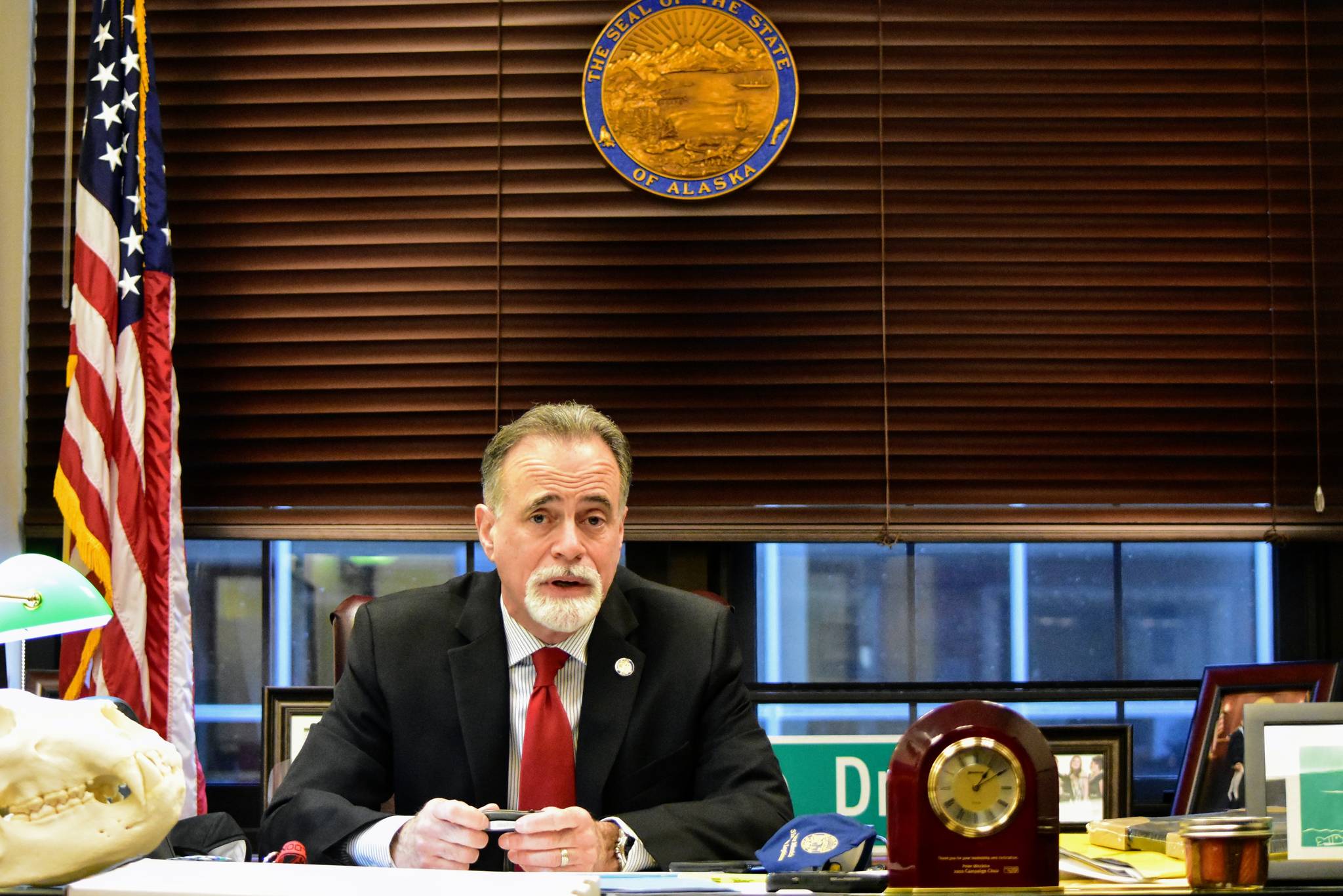The Alaska Senate introduced dozens of new bills Friday, plowing ahead with legislative work even as the House of Representatives remains unorganized.
Twenty-nine bills and seven resolutions were read across in a brief floor session Friday morning — legislation pre-filed by senators before the start of the session and three constitutional amendments submitted by the governor. Items were referred to the appropriate committees, whose leadership this year is dominated by the Republican-led Senate Majority.
Senate Republicans and Sen. Lyman Hoffman, D-Bethel, formed a majority caucus that on Wednesday announced committee assignments. Of the 10 Senate committees, Democrats hold no chairmanships.
The Senate was able to come to an agreement for its president before the session started, and on the first day back in Juneau unanimously elected Sen. Peter Micciche, R-Soldotna, to the position.
Micciche got his start in politics on the Soldotna City Council before being elected directly to the Senate in 2012. Much of his career has been spent with ConocoPhilips, he said, but he’s held various jobs over the years, including running a small painting business in his 20s and being a lifelong commercial fisherman.
New Legislature, same issues, says Juneau’s delegation
Micciche said during an interview Friday in his soon-to-be-former office at the Capitol that as Senate president he wants to bring an unprecedented level of communication to the office.
“The public is going to see communication like they’ve never seen before,” he said.
The depth of Alaska’s fiscal problems hasn’t been explained to the public very well, Micciche said, as politicians tend to use technical language most people aren’t familiar with.
“To folks that only listen periodically, we have not done a good job in deciphering what we’re talking about,” he said.
A Jan. 19, statement from the Alaska Senate Majority said lawmakers organized around a “caucus of equals” philosophy that recognizes a diverse array of viewpoints.
Last year, several Republican lawmakers lost their committee assignments after having violated the binding caucus rules. Many of those lawmakers were extremely critical of binding caucus rules and one of them, Sen. Mike Shower, R-Wasilla, introduced legislation to prohibit their use.
Micciche said he intended to listen to all viewpoints and seek input from a diverse array of political stances.
“We have folks of both extreme ends of the issues,” he said. “No matter how each Alaskan feels, we have members in each of those camps and everything in the middle.”
Still, the Legislature remains deeply divided over the same issues that have frustrated lawmakers for years, he said, namely the Permanent Fund Dividend. How much of the state budget should go to dividends is the question that needs to be answered before the state can start to adequately address its fiscal problems.
[Governor confident in Alaska’s ability to recover]
Gov. Mike Dunleavy has said much the same thing and has introduced three constitutional amendments — a government spending cap, a vote of the people for all new taxes and an established formula for the PFD — he hopes will resolve those intractable issues. But those would have to be put to a vote which can’t occur until late this year.
The state had used the last of the Constitutional Budget Reserve last year, Micciche said, and there are no additional savings for the state to tap into. That fiscal reality, Micciche said, will hopefully motivate lawmakers to take the necessary action to solve the state’s budget problems.
Alaska’s current budget was built at a time when the state had far more revenue than it currently does, Micciche said, and the state simply cannot maintain its current level of services. Some lawmakers have favored solutions that affect only one demographic, but Micciche favors what he called an “all-in” approach to balancing the budget that cut more universally, in a way that didn’t single out specific groups.
New revenue or no service, lawmakers weigh options
“Lower dividends, reduction in the cost of government, additional industry participation, and considering how Alaskans are going to participate in paying for their services,” he said, should all be part of the solution.
Several lawmakers have been adamant about using 50% of the state’s annual draw from the Earnings Reserve Account for the Permanent Fund Dividend and the rest for state services. While there was a court case that allowed the Legislature to appropriate PFD amounts, Micciche said leaving Alaskans wondering how much they could expect to receive each year isn’t a good way to govern.
But there hasn’t been movement on that issue, and Micciche said again he is hopeful the state’s dire fiscal reality will motivate lawmakers to compromise.
“People are adjusting to the fact that we have to look at things a little differently,” he said. “They’ve already gotten closer (to compromise). That’s huge.”
However, with the Alaska House of Representatives deadlocked there’s only so much work the Senate can do before legislative work has to go to the other body. That is concerning, Micciche said, given that the state has no more savings to tap into.
“We burned through billions in the CBR fumbling around trying to get to a decision,” he said. “We simply cannot allow the Earnings reserve to be eroded at the same rate. We have to solve this problem.”
• Contact reporter Peter Segall at psegall@juneauempire.com. Follow him on Twitter at @SegallJnuEmpire.

